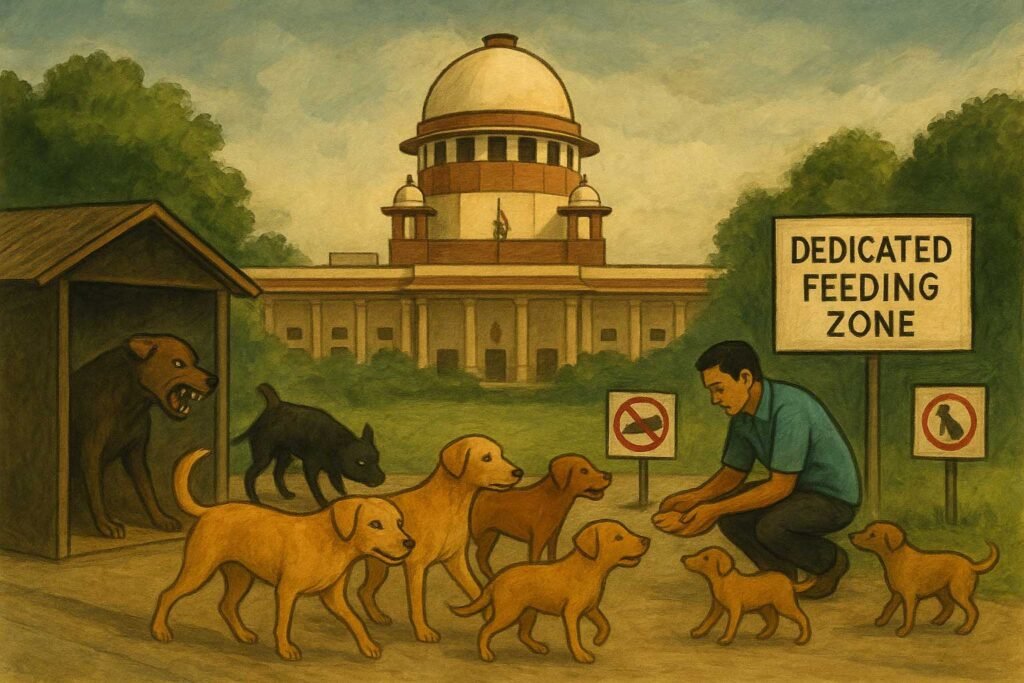Introduction
August 22, 2025, brought relief for the stray dogs and their well-wishers, the Supreme Court of India revisited its earlier interim directions regarding the management of stray dogs in Delhi-NCR and across India. A three-judge bench comprising Justice Vikram Nath, Justice Sandeep Mehta, and Justice NV Anjaria stayed parts of the August 11 order passed by a two-judge bench, which had categorically prohibited the release of stray dogs after capture. The Court reasoned that such a blanket prohibition was inconsistent with the Animal Birth Control (ABC) Rules, lacked scientific rationale, and posed practical and humane difficulties.
Core Holding of the Bench
The Court clarified that:
- Sterilised, dewormed, and vaccinated stray dogs must be released back into the same locality from where they were picked up.
- Exceptions apply only to dogs infected with rabies, suspected to be rabid, or displaying aggressive behaviour. Such dogs may not be released and must be housed in shelters/pounds.
- This modification stems from Rule 11(9) of the ABC Rules, which expressly requires relocation of treated strays to their original habitat.
The Court found the August 11 prohibition on release “too harsh” and inconsistent with the statutory framework.
Directions Issued
The operative directions of the three-judge bench may be summarised as follows:
- Implementation of ABC Rules: Municipal authorities must comply with earlier orders mandating the creation of shelters and dog pounds (paras 12.1 and 12.2 of the August 11 order).
- Release of Treated Dogs: Paras 12.3 and 12.4 of the August 11 order, which barred release, are stayed. Dogs must be sterilised, dewormed, vaccinated, and released back to their original locality, except rabid/aggressive dogs.
- Management of Rabid/Aggressive Dogs: Such dogs must be sterilised and immunised, but permanently housed in separate shelters/pounds.
- Public Feeding Restrictions: Feeding of stray dogs on public roads is prohibited. Municipal bodies must designate feeding spaces in each ward, with signboards specifying the locations.
- Enforcement Mechanism: Municipalities must establish helpline numbers for complaints about violations. Individuals obstructing municipal authorities in dog-catching operations will face prosecution.
- Financial Deposits: Each petitioner-NGO must deposit ₹2 lakhs, and each individual petitioner ₹25,000, with the Registry of the Supreme Court. These funds will support infrastructure for strays under municipal control.
- Adoption Protocol: Dog lovers may apply to adopt stray dogs from municipal authorities. Adopted dogs must be tagged, and responsibility for preventing their return to the streets lies with the adopter.
- Compliance Affidavits: Municipal bodies must submit affidavits detailing resources (dog pounds, veterinarians, cages, dog-catching personnel) to demonstrate readiness for ABC compliance.
Judicial Reasoning: A Scientific & Humane Framework
The Court underscored the scientific basis of Rule 11(9) of the ABC Rules:
- Population Control: Returning sterilised and vaccinated dogs prevents overcrowding in shelters and helps stabilise the stray population in their original habitat.
- Behavioural Adjustment: Dogs are accustomed to their environment. Relocating them elsewhere or permanently housing them in shelters leads to stress, aggression, and logistical overload.
- Compassionate Approach: Allowing dogs to return to familiar surroundings aligns with animal welfare principles while ensuring public safety.
The Court also highlighted reports of public nuisance caused by unregulated feeding, justifying the prohibition on street feeding and the mandate to create regulated feeding zones.
Extension Beyond Delhi-NCR
Significantly, the Court expanded the scope of the matter from Delhi-NCR to pan-India, impleading all States, Union Territories, Animal Husbandry Secretaries, and municipal bodies. The bench also expressed its intention to transfer pending High Court cases on stray dogs to itself for the formulation of a uniform national policy.
Procedural History
- July 28, 2025 – A two-judge bench (Justices JB Pardiwala and R Mahadevan) took suo motu cognisance of a Times of India report titled “In a city hounded by strays, kids pay price.”
- August 11, 2025 – The bench directed immediate creation of shelters, prohibited the release of stray dogs, and mandated a statewide dog-capturing drive.
- August 13, 2025 – The case was transferred to the present three-judge bench after concerns were raised about a conflict with earlier SC orders.
- August 14, 2025 – The bench reserved orders on whether to stay the August 11 directions.
- August 22, 2025 – The bench issued the present modified directions.
Implications of the Judgment
- For Municipal Bodies: Municipalities must operationalise shelters, helplines, and feeding zones while ensuring compliance with ABC rules.
- For NGOs & Dog Lovers: Stricter regulation on feeding and mandatory financial deposits will limit unregulated interventions. Adoption is formalised as a structured alternative.
- For Policy Development: The Supreme Court is steering towards a uniform national policy on stray dog management, balancing public safety, animal rights, and administrative feasibility.
- For Jurisprudence: The order reconciles competing interests—public health and safety vs. animal welfare—through a measured, scientific, and statutory approach.
Conclusion
By modifying the August 11 order, the Supreme Court has reaffirmed the primacy of the ABC Rules and ensured a more balanced approach to stray dog management. The ruling integrates public safety, scientific reasoning, and humane treatment of animals while laying the groundwork for a national legal framework on the issue.
SC took a balanced approach to meet the necessary precautions to address the stray dogs problem. When the last order to capture the stray dogs came into existence, NGO’s and animal lovers disagreed with the previous order. There was a mixed opinion about the last order. Some people who think stray dogs are really a threat to elders and children welcomed it, but others who think stray dogs are innocent were disappointed with the last order.


